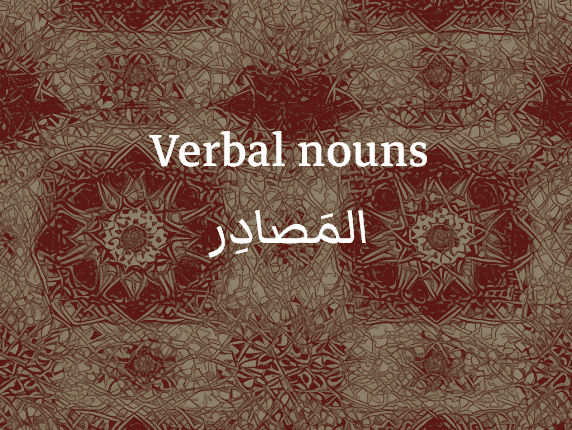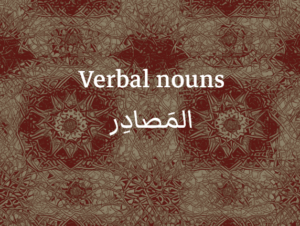Verbal nouns / المَصادِر

The term المَصْدَر, or ‘the source’ in English, is a noun that originates from the verb and signifies the action, quality or condition described by it. We have already seen verbal nouns in Arabic for augmented forms (الأَوْزان المَزِيدة) under the ‘Intermediate section‘, but not for Form I. We mentioned that, unlike the augmented forms where each form corresponds to one or two verbal noun patterns, there are too many different verbal noun forms for Form I to consider them as a specific pattern that could be displayed on the table. In this section, we’ll deal with the six different types of verbal nouns which are:
- The original maṣdar / المصدر الأصلي
- The mīm maṣdar / المَصْدَر المِيمي
- The parent maṣdar / اِسْم المصدر
- The crafted maṣdar / المَصْدَر الصِناعي
- The noun of one time / اسم المرة
- The noun of manner / اسم الهَيْئة
The original maṣdar / المَصْدر الأصلي
The original maṣdar is the name given to verbal nouns corresponding to verbs in their simplest form (i.e. form I) whether they are triliteral ثُلاثي or quadriliteral رُباعي. In this section we’ll only deal with the most common verbal noun patterns for triliteral verbs under Form I.
| الأَمْثِلة Examples | الوَزْن Pattern | ||
|---|---|---|---|
| مَدْح praise | نَقْل transportation | فَتْح opening | فَعْل most common for transitive verbs |
| شُرْب action of drinking | جُبْن cowardice | بُخْل avarice | فُعْل most common for transitive verbs |
| فَرَح joy | أَسَف regret | عَمَل work | فَعَل comes from transitive verbs on pattern فَعُلَ |
| رُجُوع return | صُعود rise/ascension | وُصُول arrival | فُعُول for verbs of motion |
| خِياطة sewing | زِراعة agriculture | تِجارة commerce | فِعالة indicates a craft or its likeness |
| يُبوسَةٌ dryness | سُهُولة simplicity | صُعُوبة hardness | فُعُولة comes from transitive verbs on pattern فَعُلَ |
| طَيَرَان flying | غَلَيان ebullition | جَوَلان circulation | فَعَلان verbs indicating volatility and disorder |
The mīm maṣdar / المَصْدَر المِيمي
The mīm maṣdar begins with a mīm (م) and a fatḥa and has the same connotation as the original maṣdar, but surpasses it in the strength and emphasis of the connotation. It is always in the masculine singular form.
| الأَمْثِلة Examples | الوَزْن Pattern | وَزْن الفعل Verbal form | |
|---|---|---|---|
| مَمات death | مَطْلب demand | مَفْعَل | الثُلاثي المُجَرَّد simple triliteral root (form I) |
مُوْقِف position | مَوْعِد appointment | مَفْعِل | الثُلاثي المُجَرَّد simple assimilated triliteral root (form I) starting with wāw واو |
مَغْفِرَة forgiveness | مَعْرِفة knowledge | مَفْعِلة | بَعْض الثُلاثي المُجَرَّد some simple triliteral root (form I) |
| مُنْطَلق premise | مُرْتَقَب outlook | وَزْن اسم المفعول passive participle pattern | الثُلاثي المَزِيد augmented triliteral roots |
The parent maṣdar / اِسْم المصدر
The parent maṣdar (اِسْم المصدر) is the name give to an original maṣdar (المَصْدر الأصلي) of Form I connected to an augmented verb. It supplants in usage the verbal noun (المَصْدر) of the specific verb it is related to, which is also called المَصْدَر القِياسِيّ (regular maṣdar).
| اِسْم المَصْدَر Parent maṣdar | المَصْدَر القِياسِيّ Regular maṣdar | الفِعْل Verb |
|---|---|---|
| عَطاء gift | إعْطاء (unused) | أَعْطَى to give |
| قَسَم oath | إِقْسام (unused) | أَقْسَمَ to swear |
| وُضُوء ablution | تَوَضُّؤ (unused) | تَوَضَّأَ to perform the islamic ritual ablution |
| حُبّ love | إِحْباب (unused) | أَحَبَّ to love |
| خَطَأ mistake | إِخْطاء (unused) | أَخْطَأَ to make a mistake |
| سَفَر travel/trip | مُسافَرَة (unused) | سافَرَ to travel |
| نُزْهة promenade/walk | تَنَزُّه (unused) | تَنَزَّهَ to stroll/to go for a walk |
| صَلاة islamic ritual prayer | تَصْلِية (unused) | صَلَّى to perform the islamic ritual prayer |
The crafted maṣdar / المَصْدَر الصِِناعي
It is a verbal noun that denotes an abstract meaning that is used to designate a political doctrine, methodology or concept…
It is constructed by adding a ya’ with a shadda followed by a ta ‘ marbūṭa at the end of the noun يّة.
| Christianism | النَصْرانيّة |
| Racism | العُنْصُورِيّة |
| Communism | الشُيُوعِيّة |
| Humanity | الإنْسانيّة |
Verbal noun of one time / مَصْدَر المرة
Adding a ta’ marbūṭa (ة) to the verbal noun of both simple and augmented forms indicates the action has been performed only once. Verbal nouns related to verbs of a simple form (form I) will adopt pattern فَعْلة.
| One strike | ضَرْبة |
| One shout | صَرْخة |
| One departure | اِنْطِلاقة |
| One smile | اِبْتِسامة |
Note: This form is impossible for verbal nouns that already end with the ta’ marbūṭa ة. Henceforth, we are compelled to add the word واحدة to specify that the action has only been performed once.
One visit زِيارة واحِدة One reading قِراءة واحِدة
Note 2: The verbal noun of one time can be dual or plural.
2 strikes ضَرْبتانِ Several strikes ضَرَبات
Verbal noun of manner / مَصْدَر الهَيْئة
The verbal noun of manner is built on the pattern فِعْلة and indicates how the action was performed. It is related to verbs that indicate a physical, tangible event. It only exists for verbs on form I.
| ألأَمْثِلة Examples | الوَزْن Pattern |
|---|---|
| جِلْسة Way of seating | فِعْلة |
| نِظْرة Way of looking | |
| مِشْية Way of walking | |
| ضِحْكة Way of laughing |
Note: Most of the time this noun is used as a 1st term of annexation (مُضاف) or has an adjective (نَعْت) related to it.
Karim sat like a king (litt. he sat the way kings sit) جَلَسَ كَرِيمٌ جِلْسةَ المُلُوكِ Zainab laughed grudgingly (litt. “she laughed in a yellow manner” which is a figurative expression) ضَحِكَتْ زَيْنَبُ ضِحْكةً صَفْراءً
Verbal nouns

Learn about verbal nouns in Arabic grammar! This guide covers the basics of verbal nouns, including their formation, functions, and usage in sentences. Get a better understanding of this important concept to improve your Arabic language skills.
Course Provider: Organization
Course Provider Name: ArabiKey
Course Provider URL: https://arabikey.com
5

Responses